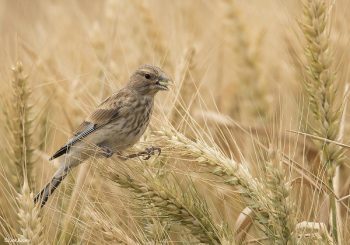By Amelia Harris
Staff Writer for Wake Up World
In recent years, bees have rightly garnered a lot of attention for their declining numbers due to pesticides and other environmental factors. But another population that is greatly affected is farmland birds. (1)
From 1966 to 2013, the populations of 57 out of 77 North American farmland birds declined. A review of 122 published studies about these birds indicated that the use of pesticides has had the most negative impact on these birds, followed by habitat loss. (2)
Sparrows and Pesticides
One study took a closer look at the way a specific pesticide affects birds during migration. The research team focused on imidacloprid, one type of neonicotinoid, which are neurological toxins. Farmers use them to kill pests that eat seedlings. They apply imidacloprid to seeds before planting them. (1, 3)
This type of chemical is supposed to be less toxic to birds and mammals than to insects. But seed spills and unburied seeds can lead to neonicotinoids ending up in the environment and impacting vertebrates. They are also linked to the declining honeybee population. (1, 3)
The findings from the study suggest that neonicotinoids are more harmful to birds than previously thought. The researchers caught migrating white-crowned sparrows as they paused at a stopover site in southern Ontario. They fed birds in the test group seeds treated with imidacloprid, while the control group was fed untreated seeds. (1, 3)
Researchers weighed the birds and affixed radio transmitters to them. Within six hours, the birds who ate the seeds treated with imidacloprid had lost 6% of their body weight, as well as some body fat. (1, 3)
After they were released, the birds who had eaten the untreated control seeds continued on their migratory path after half a day. The birds who ingested imidacloprid took a median time of four days to continue their journey. (1, 3)
Nicole Michel, who is a senior quantitative ecologist at the National Audubon Society, says that even seemingly small changes in migration can have dire effects. “A delay of three and a half days may not sound like much, but it is huge,” she told Scientific American. Michel was not involved with the study. (1)
According to Michel, 90% of bird mortality happens during migration. Birds are more vulnerable to predators when they spend longer periods of time at stopover sites. They can also have more difficulty finding mates and nesting sites once they arrive at their destination. (1)
Disputed Findings
Bayer is the company that manufactures neonicotinoid insecticides. Their Crop Division sent a statement to Scientific American that disputes the findings of the study. “The study does not establish a link between use of neonicotinoid insecticides [in agriculture] and negative effects on populations of migrating songbirds,” the statement says. “The authors have previously reported biological monitoring data that contradicts the notion that migrating songbirds are frequently being exposed to significant amounts of neonicotinoids.” (1)
However, Christy Morrissey, who co-authored the study, denies Bayer’s criticism. Birds in the study were given small doses of imidacloprid. And the team’s previous research found low levels of the insecticide in 78% of the birds they studied. (1)
“This is a clear indication that the sparrows were recently exposed to the chemical, as these are known to be rapidly metabolized and cleared from the body,” Morrissey said. “This suggests exposure to imidacloprid is widespread and common in migratory songbirds.” (1)
Article sources:
- https://www.scientificamerican.com/article/migrating-birds-may-be-collateral-damage-for-a-popular-pesticide/
- https://www.sciencedirect.com/science/article/abs/pii/S016788091730525X?viaihub
- https://www.newscientist.com/article/2216318-decline-of-migrating-birds-could-be-partly-due-to-pesticides/
About the author:
Amelia Harris is a writer and eco-activist, interested in health and all things esoteric, with a passion for sharing good news and inspiring stories. She is a staff writer for Wake Up World.

If you've ever found value in our articles, we'd greatly appreciate your support by purchasing Mindful Meditation Techniques for Kids - A Practical Guide for Adults to Empower Kids with the Gift of Inner Peace and Resilience for Life.
In the spirit of mindfulness, we encourage you to choose the paperback version. Delve into its pages away from screen glare and notifications, allowing yourself to fully immerse in the transformative practices within. The physical book enriches the learning process and serves as a tangible commitment to mindfulness, easily shared among family and friends.
Over the past few years, Wake Up World has faced significant online censorship, impacting our financial ability to stay online. Instead of soliciting donations, we're exploring win-win solutions with our readers to remain financially viable. Moving into book publishing, we hope to secure ongoing funds to continue our mission. With over 8,500 articles published in the past 13 years, we are committed to keeping our content free and accessible to everyone, without resorting to a paywall.







